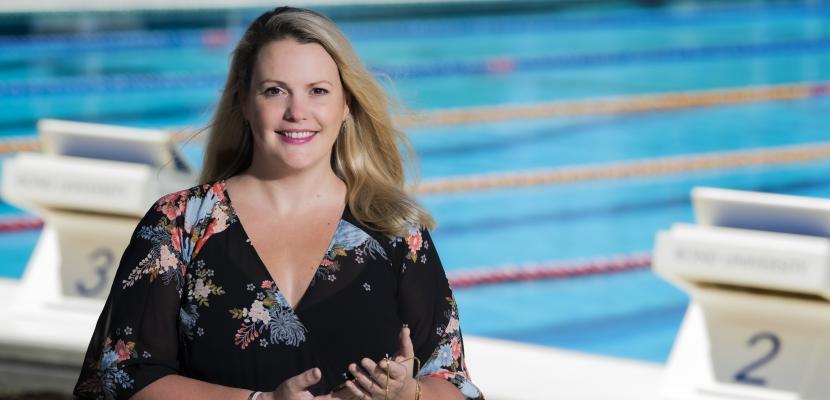
Bond University Master of Communication student – and former Olympian and two-time Commonwealth Games gold medallist – Joanna Fargus. PICTURE: Cavan Flynn
After failing to qualify at the Australian Olympic trials in 2008, former Olympian and two-time Commonwealth Games gold medallist Joanna Fargus knew her time in the pool had come to a cold, shallow end.
At just 26-years-old, the 200-metre backstroke swimmer made the immediate decision to retire – leaving both her career and social network behind her.
While the transition between elite sport and normal life is challenging for most athletes, Ms Fargus grappled with her new reality for over 10 years.
“I never actually had a ritual transition right out of sport. It was just that was the old me, this is the new me,” she said.
“Coming at it from the perspective of death, it's not like physically dying but a part of you that dies.”
Unlike most milestones – birthdays, changing jobs, having children – the transition from elite sports is not grounded in rituals. For Ms Fargus, she felt like she never had the opportunity to fully come to terms with her previous life as an athlete.
“I rejected everything about my former life,” she said.
“I hated being referred to as a swimmer and it took me, I'd say 10 years, to really look back at my achievements and my time as an athlete in a positive light.”
During her transition out of the spotlight, Ms Fargus searched for programs or processes that would ease her adjustment; only to find that there were none.
Now, over a decade later, Ms Fargus is looking to be a guiding light for other elite athletes who find themselves in the same position.
Ms Fargus is studying her Master of Communication from Bond University, developing a master’s thesis on the effects of the transition out of elite sports on self-identity. Through her research, she plans on developing practical programs for professional sports teams and bodies to implement.
“I think that there needs to be some kind of program or process, whether it's mentoring or coaching, that organisations need to adopt in order to help someone define who they are as a whole,” Ms Fargus said.
“Particularly for athletes, their sports career is still a part of them but not all of them.”
Despite this challenge, Ms Fargus believes that laying the foundations for a life outside of sport can happen early on.
Through her research and personal experience, she has seen the value of networking, making connections with people in fields outside of sport, and diversifying one's skills.
“There is a quote I love, ‘it’s not about having a plan B, but an alternative plan A,’” she said.
“It is extremely important to have some perspective as to what happens next.”
Although cathartic, Ms Fargus is proud to contribute her research and experience to this field.
Her master’s thesis will be submitted in August.